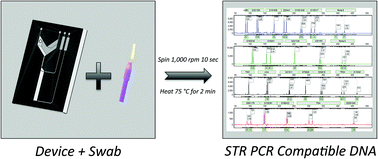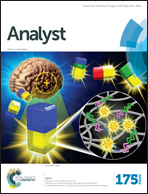Microfluidic enzymatic DNA extraction on a hybrid polyester-toner-PMMA device†
Abstract
To date, the forensic community regards solid phase extraction (SPE) as the most effective methodology for the purification of DNA for use in short tandem repeat (STR) polymerase chain reaction (PCR) amplification. While a dominant methodology, SPE protocols generally necessitate the use of PCR inhibitors (guanidine, IPA) and, in addition, can demand timescales of up to 30 min due to the necessary load, wash and elution steps. The recent discovery and characterization of the EA1 protease has allowed the user to enzymatically extract (not purify) DNA, dramatically simplifying the task of producing a PCR-ready template. Despite this, this procedure has yet to make a significant impact on microfluidic technologies. Here, we describe a microfluidic device that implements the EA1 enzyme for DNA extraction by incorporating it into a hybrid microdevice comprising laminated polyester (Pe) and PMMA layers. The PMMA layer provides a macro-to-micro interface for introducing the biological sample into the microfluidic architecture, whilst also possessing the necessary dimensions to function as the swab acceptor. Pre-loaded reagents are then introduced to the swab chamber centrifugally, initiating DNA extraction at 75 °C. The extraction of DNA occurs in timescales of less than 3 min and any external hardware associated with the transportation of reagents by pneumatic pumping is eliminated. Finally, multiplexing is demonstrated with a circular device containing eight separate chambers for the simultaneous processing of eight buccal swab samples. The studies here provide DNA concentrations up to 10 ng μL−1 with a 100% success rate in less than 3 minutes. The STR profiles generated using these extracted samples demonstrate that the DNA is of PCR forensic-quality and adequate for human identification.



 Please wait while we load your content...
Please wait while we load your content...